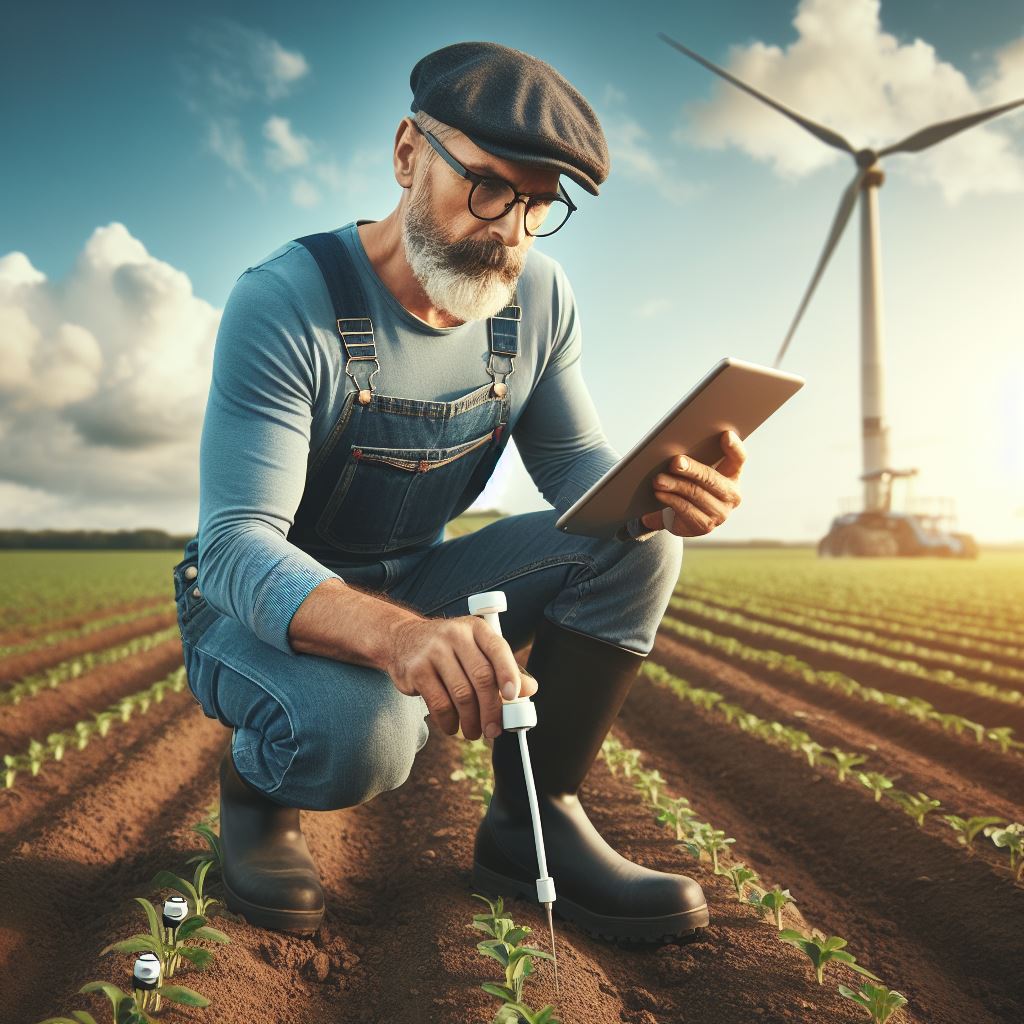Introduction
Crop yield is of utmost importance in agriculture as it directly affects food production and sustainability.
Smart soil sensors are emerging as a solution to optimize crop yield and address various agricultural challenges.
In the dynamic landscape of agriculture, where the intersection of technology and tradition continually reshapes farming practices, the emergence of smart soil sensors stands as a beacon of innovation.
These cutting-edge devices harness the power of data analytics and sensor technology to delve deep into the intricate nuances of soil composition, moisture levels, nutrient content, and more.
By providing farmers with real-time, granular insights into the very essence of their fields, smart soil sensors empower them to fine-tune their cultivation methods with unprecedented precision.
Gone are the days of reliance solely on intuition or generalized practices.
With smart soil sensors, farmers can tailor their approach to each individual plot of land, optimizing irrigation schedules, fertilizer applications, and planting strategies to match the specific needs of the soil and crops.
This level of precision not only enhances crop yields but also promotes environmental sustainability by minimizing resource waste and mitigating the risks of over-application.
Furthermore, the integration of smart soil sensors into agricultural operations represents a significant step towards the realization of precision agriculture—a holistic farming approach that leverages technology to optimize every aspect of the production process.
As these sensors become more sophisticated and accessible, they hold the potential to revolutionize farming practices on a global scale, fostering resilience in the face of climate change, resource scarcity, and evolving market demands.
In this era of unprecedented challenges and opportunities in agriculture, smart soil sensors emerge as invaluable allies, empowering farmers to cultivate more efficiently, sustainably, and profitably than ever before.
As we delve deeper into their capabilities and potential applications, it becomes increasingly clear that smart soil sensors are not just tools but catalysts for a new era of agricultural excellence.
What are smart soil sensors?
Definition and basic functionality
Smart soil sensors are devices that measure and monitor soil conditions in real-time.
These sensors collect data on various parameters such as moisture level, temperature, and nutrient content.
They function by inserting probes into the soil, which then transmit the collected data to a central system.
Transform Your Agribusiness
Unlock your farm's potential with expert advice tailored to your needs. Get actionable steps that drive real results.
Get StartedThe data can be accessed and analyzed to make informed decisions about crop management.
Smart soil sensors use advanced technology to provide accurate and precise measurements.
They can detect changes in soil conditions and alert farmers when action is needed.
These sensors are designed to withstand harsh environmental conditions and have a long lifespan.
They are typically wireless, allowing for easy installation and maintenance.
How they collect data
Smart soil sensors collect data through various methods such as resistive, capacitive, or spectral measurements.
Resistive sensors measure the electrical resistance of the soil, which is correlated to moisture content.
Capacitive sensors measure the dielectric constant of the soil, which is related to water content.
Spectral measurements use light to analyze the soil’s nutrient content and other parameters.
Importance of accurate data
Accurate data is crucial for effective decision-making in agriculture.
Farmers can optimize irrigation schedules based on real-time soil moisture data.
They can also adjust fertilizer application rates based on nutrient levels measured by smart sensors.
Accurate data helps prevent over-irrigation or under-fertilization, reducing water and fertilizer waste.
By monitoring soil conditions, farmers can detect early signs of plant stress or disease.
They can take preventive measures to minimize crop losses and maximize yields.
The ability to collect real-time data allows for timely interventions in case of adverse soil conditions.
Smart soil sensors help improve resource management by enabling precision agriculture.
Farmers can optimize inputs such as water, fertilizers, and pesticides based on actual soil conditions.
This reduces costs and minimizes environmental impact, leading to sustainable farming practices.
Accurate data from smart soil sensors also supports research and innovation in agriculture.
Researchers can analyze soil data to understand the impact of different factors on crop growth and productivity.
They can develop new strategies and techniques to improve soil health and nutrient management.
Smart soil sensors have significant implications for food security and global agriculture.
By improving crop yields and reducing resource wastage, they contribute to meeting the growing food demand.
Showcase Your Farming Business
Publish your professional farming services profile on our blog for a one-time fee of $200 and reach a dedicated audience of farmers and agribusiness owners.
Publish Your ProfileTheir ability to provide real-time data enables farmers to adapt to changing climatic conditions.
They can make informed decisions to mitigate the effects of droughts, floods, or extreme temperatures.
Overall, smart soil sensors are revolutionizing agriculture by providing accurate data for efficient crop management.
Their use can boost yields, reduce costs, and promote sustainable and resilient farming practices.
Read: Robotic Farm Hands: The New Agri Trend
Benefits of using smart soil sensors
Smart soil sensors have revolutionized the agricultural industry by boosting crop yields.
These sensors provide numerous benefits, such as improved water management, optimized fertilizer usage, and real-time monitoring and adjustments.
By utilizing smart soil sensors, farmers can reduce costs and minimize their environmental impact.
Improved water management
One of the main advantages of using smart soil sensors is improved water management.
These sensors can accurately measure soil moisture levels, enabling farmers to water their crops more efficiently.
With real-time data on soil moisture, farmers can avoid overwatering or underwatering, which can lead to crop stress or yield loss.
As a result, crop yields are maximized, and water resources are conserved.
Optimized fertilizer usage
Optimized fertilizer usage is another significant benefit of utilizing smart soil sensors.
These sensors provide farmers with precise information about soil nutrient levels, allowing them to apply fertilizers in precise amounts when and where they are needed.
This targeted approach eliminates unnecessary fertilizer use, reducing costs and minimizing environmental pollution caused by fertilizer runoff or leaching.
Real-time monitoring and adjustments
Real-time monitoring and adjustments are crucial for successful crop management. Smart soil sensors continuously collect data on temperature, humidity, and soil conditions.
This information is transmitted wirelessly to farmers’ devices, allowing them to monitor their crops remotely.
By staying updated on real-time data, farmers can make timely adjustments to irrigation schedules, fertilization plans, or pest control strategies, leading to healthier and more productive crops.
Reduced costs and environmental impact
In addition to improving crop yield and quality, smart soil sensors also contribute to reduced costs and environmental impact.
By using these sensors, farmers can optimize their agricultural practices, resulting in higher efficiency and lower production costs.
Precise water and fertilizer application prevent wastage, saving money and conserving resources.
Moreover, by minimizing the use of chemicals and reducing water consumption, smart soil sensors help protect the environment from pollution and preserve natural ecosystems.
To summarize, the benefits of using smart soil sensors in agriculture are undeniable. Farmers can achieve improved water management by avoiding overwatering or underwatering their crops.
Optimized fertilizer usage ensures that nutrients are applied efficiently, reducing costs and environmental pollution.
Real-time monitoring and adjustments enable farmers to make timely decisions for optimal crop growth.
Lastly, smart soil sensors help reduce production costs and minimize the impact on the environment.
Embracing this technology is a game-changer for farmers seeking sustainable and profitable farming practices.
Why wait? Start incorporating smart soil sensors into your agricultural practices now and reap the benefits of increased crop yields, reduced costs, and a greener planet.
Read: Drone Tech in Agriculture: A Game Changer
How smart soil sensors boost crop yields
Smart soil sensors play a crucial role in maximizing crop yields and ensuring optimal soil conditions.
These innovative devices have revolutionized farming techniques by providing real-time data on soil moisture, temperature, and nutrient levels.
By harnessing the power of technology, smart soil sensors enable farmers to make informed decisions and optimize their farming practices.
Ensuring optimal soil conditions
Smart soil sensors allow farmers to monitor and maintain the ideal soil conditions necessary for crop growth.
These sensors measure important soil parameters such as pH levels, salinity, and organic matter content.
Armed with this information, farmers can adjust their soil management practices accordingly, ensuring that crops receive the necessary nutrients for optimal growth.
Timely Irrigation and Fertilization:
One of the key benefits of smart soil sensors is their ability to provide real-time data on soil moisture levels.
By accurately measuring soil moisture, farmers can determine the exact amount of water needed by their crops.
This helps prevent over or under watering, which can lead to crop stress and reduced yields.
Moreover, these sensors can also inform farmers about the moisture content at different soil depths, allowing for precise irrigation practices.
Similarly, smart soil sensors aid in optimizing fertilization practices. By monitoring nutrient levels in the soil, farmers can apply fertilizers more efficiently.
Showcase Your Farming Business
Publish your professional farming services profile on our blog for a one-time fee of $200 and reach a dedicated audience of farmers and agribusiness owners.
Publish Your ProfileThis not only reduces the risk of nutrient runoff but also ensures that crops receive the right amount of nutrients at the right time.
As a result, crop productivity and nutrient uptake are enhanced, leading to higher yields.
Minimizing Plant Stress and Diseases:
By providing continuous monitoring of soil conditions, smart soil sensors help farmers identify and address potential issues promptly.
These sensors can detect unusual soil moisture patterns or fluctuations in temperature, enabling farmers to take immediate corrective actions.
This proactive approach minimizes plant stress and reduces the risk of diseases caused by unfavorable soil conditions.
In addition, smart soil sensors also aid in weed and pest management.
By monitoring soil conditions and identifying ideal conditions for weed growth, farmers can implement targeted weed control strategies.
Similarly, by tracking soil temperature and moisture levels, these sensors can help farmers predict and prevent outbreaks of diseases and pests. This ensures healthier and more productive crops.
In essence, smart soil sensors have revolutionized farming practices by providing real-time data on soil moisture, temperature, and nutrient levels.
Through ensuring optimal soil conditions, enabling timely irrigation and fertilization, and minimizing plant stress and diseases, these sensors contribute to boosting crop yields significantly.
By leveraging technology in agriculture, farmers can make more informed decisions and improve overall crop productivity and sustainability.
Read: The Rise of Smart Farming Technologies

Case studies and success stories
In recent years, the agricultural industry has experienced a significant transformation with the introduction of smart soil sensors.
These innovative devices have proved to be game-changers, revolutionizing the way crops are grown and boosting yields.
Case studies and success stories around the world have highlighted the remarkable benefits of using smart soil sensors.
Let’s delve into a few examples:
Example 1: Increased Crop Yield in a Drought-Prone Region
In a region plagued by frequent droughts, farmers were struggling to grow crops and sustain their livelihoods.
However, the implementation of smart soil sensors changed the game. These sensors provided real-time data on soil moisture levels, allowing farmers to optimize their irrigation practices.
By applying water precisely when and where it was needed, farmers managed to conserve precious water resources and ensure crops received adequate hydration.
As a result, crop yields increased significantly, even in the face of prolonged dry spells. This success story served as an inspiration for other farmers facing similar challenges.
Example 2: Improved Nutrient Management for Higher Yields
Traditionally, farmers often struggle with determining the right amount of fertilizers to apply to their fields.
Applying too little results in nutrient deficiencies, while excessive application leads to wastage and environmental pollution.
Smart soil sensors, however, have revolutionized nutrient management.
By constantly monitoring soil nutrient levels, these sensors provide farmers with accurate data on the required fertilizer quantities.
Farmers can then adjust their application rates accordingly, ensuring crops receive the ideal balance of nutrients for optimal growth.
This precision in nutrient management has led to higher yields while minimizing environmental impact.
Example 3: Enhanced Crop Quality Through Data-Driven Decisions
Quality is paramount in the agricultural industry, as consumers increasingly demand high-quality produce.
Smart soil sensors have proven instrumental in enhancing crop quality through data-driven decisions.
By continuously monitoring various soil parameters, these sensors provide valuable insights into crop health and growth.
Farmers can analyze this data, identify potential issues, and take proactive measures to rectify them.
Whether it’s adjusting irrigation, modifying fertilizer application, or addressing pest infestations, data-driven decisions ensure that crops receive the necessary care and attention.
Consequently, the quality of the produce improves, leading to higher market value and increased profitability for farmers.
These case studies and success stories exemplify the transformative impact of smart soil sensors in the agricultural sector.
By harnessing the power of real-time data, farmers can make informed decisions, optimize resource allocation, and maximize crop yields.
The benefits are not limited to increased productivity alone; smart soil sensors also contribute to sustainable farming practices.
By minimizing water and fertilizer wastage, they help conserve resources and reduce the environmental footprint of agriculture.
As the technology continues to evolve and become more accessible, smart soil sensors hold tremendous promise for farmers worldwide.
Governments, researchers, and the private sector must collaborate to promote the adoption of this groundbreaking technology, ensuring its benefits reach even the most remote farming communities.
In general, smart soil sensors offer tremendous potential to boost crop yields, improve nutrient management, and enhance the overall quality of agricultural produce.
These success stories demonstrate the immense value they bring to farmers and the industry at large.
Showcase Your Farming Business
Publish your professional farming services profile on our blog for a one-time fee of $200 and reach a dedicated audience of farmers and agribusiness owners.
Publish Your ProfileWith continued investment and advancements, smart soil sensors will play a vital role in shaping the future of sustainable and efficient agriculture.
Read: AI and Agri: The Future of Crop Management
Challenges and Considerations
When it comes to implementing smart soil sensor technology, there are several challenges and considerations that need to be addressed.
These include the cost of the technology, integration with existing farming systems, and the need for technical expertise.
Cost of Smart Soil Sensor Technology
One of the main challenges associated with smart soil sensors is the cost of implementing this technology.
Smart soil sensors utilize advanced technologies such as wireless communication and data analysis, which can be expensive to develop and deploy.
Farmers need to consider the upfront investment required to purchase and install these sensors.
However, it is important to note that the long-term benefits of smart soil sensors can outweigh the initial costs.
By providing real-time data on soil conditions, these sensors enable farmers to optimize irrigation and fertilizer usage, leading to improved crop yields and potentially higher profits.
Integration with Existing Farming Systems
Another challenge that farmers may face when implementing smart soil sensors is integrating this technology with existing farming systems.
Farming practices vary widely, and many farmers have already established their own techniques and routines.
Integrating smart soil sensor technology requires farmers to adapt their current practices to incorporate the data and insights provided by the sensors.
This may involve making changes to their irrigation schedules, fertilizer application methods, or even reevaluating their overall crop management strategies.
It is crucial for farmers to carefully plan and execute the integration process to maximize the benefits of these sensors.
The Need for Technical Expertise
Effective utilization of smart soil sensor technology also requires a certain level of technical expertise.
Farmers and farm workers need to have a good understanding of how these sensors work, how to interpret the data they provide, and how to make informed decisions based on that data.
Additionally, regular maintenance and calibration of the sensors may be necessary to ensure accurate and reliable readings.
Farmers will either need to develop this expertise within their own workforce or collaborate with external consultants or experts who can assist with the implementation and management of the smart soil sensor technology.
In a nutshell, while smart soil sensors have the potential to significantly boost crop yields, their implementation does come with challenges and considerations.
The cost of the technology, integration with existing farming systems, and the need for technical expertise are all important factors that farmers need to carefully evaluate.
Despite these challenges, the benefits of smart soil sensors in terms of improved resource management, increased yields, and potentially higher profits make them worth considering.
As the technology continues to evolve and become more accessible, it is likely that the challenges associated with its implementation will diminish, making it a valuable tool for farmers worldwide.
Conclusion
Smart soil sensors have proven to be invaluable tools for boosting crop yields.
Recapping the benefits of these sensors, they provide real-time data on soil moisture, temperature, and nutrient levels.
This information allows farmers to optimize irrigation and fertilization practices, leading to healthier and more productive crops.
Furthermore, smart soil sensors help reduce water and fertilizer waste, resulting in cost savings and a more sustainable agriculture industry.
It is highly encouraged for farmers to adopt this technology in order to maximize their farm’s potential and profitability.
By implementing smart soil sensors, farmers can make data-driven decisions that optimize resource allocation and increase yield.
In the future, we can expect even more advancements in smart soil sensor technology.
There is potential for increased accuracy, integration with other farming systems, and improved user interfaces.
With ongoing research and development, smart soil sensors will continue to revolutionize the agricultural industry.
By embracing this technology, farmers can improve crop yields, reduce environmental impact, and ensure a sustainable future for agriculture.




